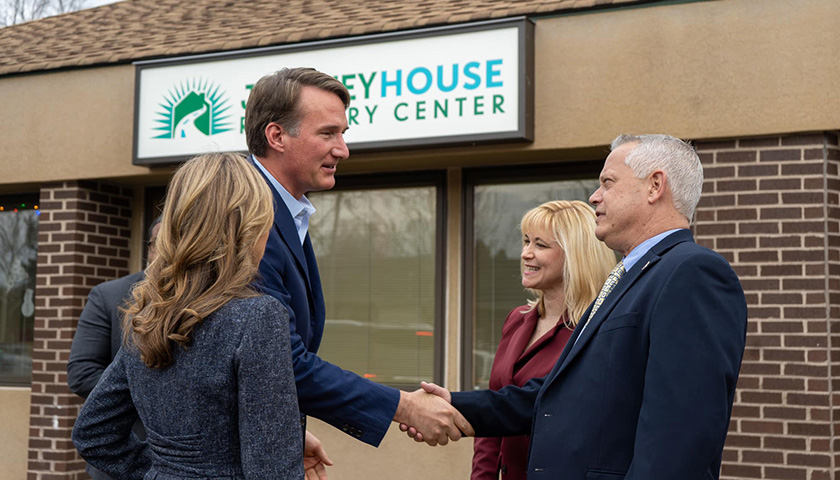by Madison Hirneisen
Gov. Glenn Youngkin will propose $230 million in his upcoming budget amendments to bolster Virginia’s behavioral health system and build crisis care capacity as part of a three-year plan unveiled Wednesday.
Youngkin’s plan, titled “Right Help, Right Now,” is aiming to reshape the state’s strained behavioral health care system. The plan outlines a six-pronged approach – ensuring same-day care for individuals in a behavioral health crisis, relieving the burden of law enforcement and decriminalizing behavioral health, building capacity for treatment beyond hospitals, targeting substance use disorder treatment, prioritizing the behavioral workforce in underserved communities and innovating crisis care services.
Elements of the plan include creating 34 new mobile crisis units to respond to 988 calls, increasing short-term crisis bed capacity by 25%, expanding telehealth psychiatric care in schools, increasing the number of crisis receiving centers in underserved communities and providing funding to support and retain the state’s behavioral health workforce.
“We have a crisis, and our behavioral health system is not equipped to deal with it. So the work starts today,” Youngkin said Wednesday from Richmond. “We’re starting today to stand on the shoulders of a broad bipartisan effort to strengthen behavioral health and the Commonwealth that has taken place over the last 15 years.”
Youngkin’s outline of his new behavioral health plan came just one day before the governor is set to announce his budget proposal for the upcoming fiscal year. The state ended the previous fiscal year with a nearly $2 billion general fund surplus.
The governor’s plan comes as Virginia is facing a shortage of behavioral health professionals. An assessment released in January found that 93 of the state’s 133 localities are “federally designated Mental Health Professional Shortage Areas.” Over one-third of the state’s population – roughly 3.2 million Virginians – live in those localities.
The governor’s budget amendments will include $230 million to fund the first year of his behavioral health plan, which will include $58 million to increase the number of crisis receiving centers, $20 million for hospitals to build dedicated psychiatric emergency service centers and $9 million to fund law enforcement personnel dedicated to transporting and monitoring patients under temporary detention orders. The budget proposal will also include $8.5 million to support the education of new psychiatrists, psychiatric nurse practitioners and other health workers.
Another key aspect of the governor’s budget proposal involved $57 million in funding to create 500 additional Medicaid Waiver Priority 1 Waitlist Slots. Youngkin said Wednesday this will help the state get closer to clearing the Priority 1 Medicaid waiver waiting list for individuals with developmental disabilities. By the end of his term, Youngkin said he wants to see the waitlist completely eliminated.
“Individuals with developmental disabilities and their families have had to navigate a maze of complex rules and long waiting lines to access the care that will allow them to live their lives independently,” Youngkin said. “We must make the system work better.”
The plan was praised by Secretary of Health and Human Resources John Littel, who called it a “massive undertaking of the entire behavioral health system and continuum of care.”
“Typically, mental health efforts in the Commonwealth only last one year and target a single area of the problem,” Littel said. “We have a multi-year plan that takes on every facet of the system. This is the first time Virginia is doing this.”
– – –
Madison Hirneisen is a staff reporter covering Virginia and West Virginia for The Center Square. Madison previously covered California for The Center Square out of Los Angeles, but recently relocated to the DC area. Her reporting has appeared in several community newspapers and The Washington Times.
Photo “Glenn Youngkin with the Journey House Foundation” by Governor of Virginia.








